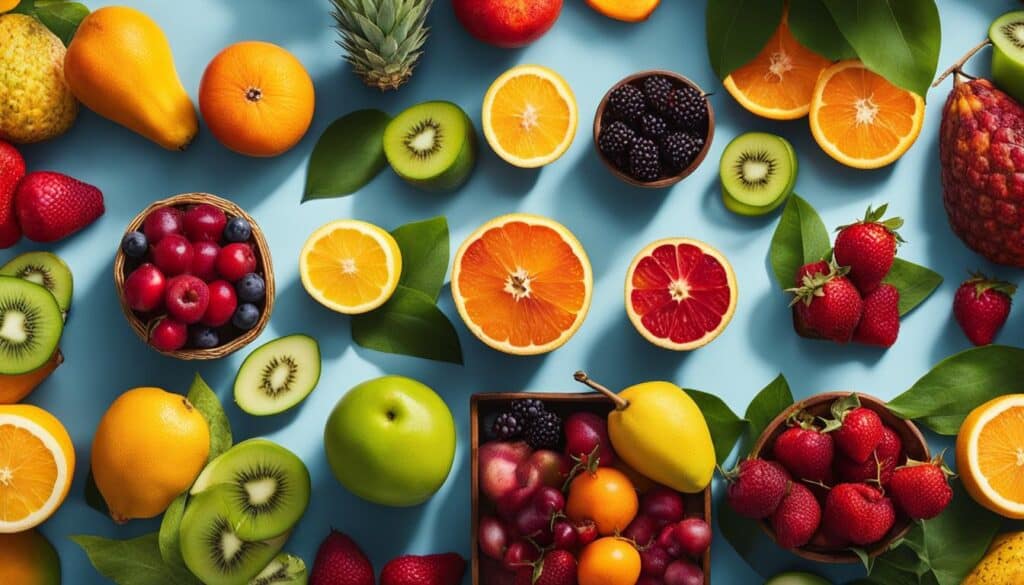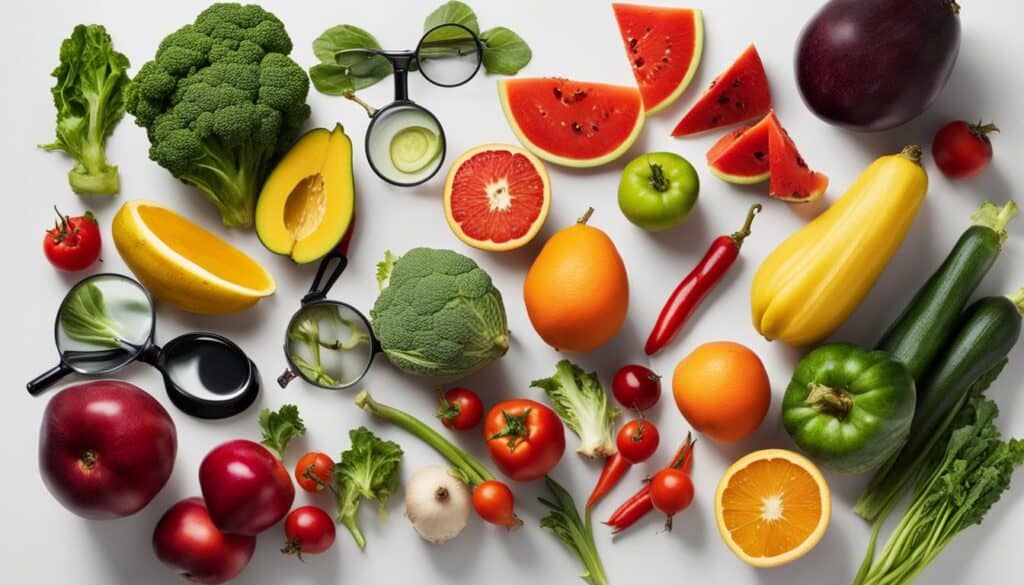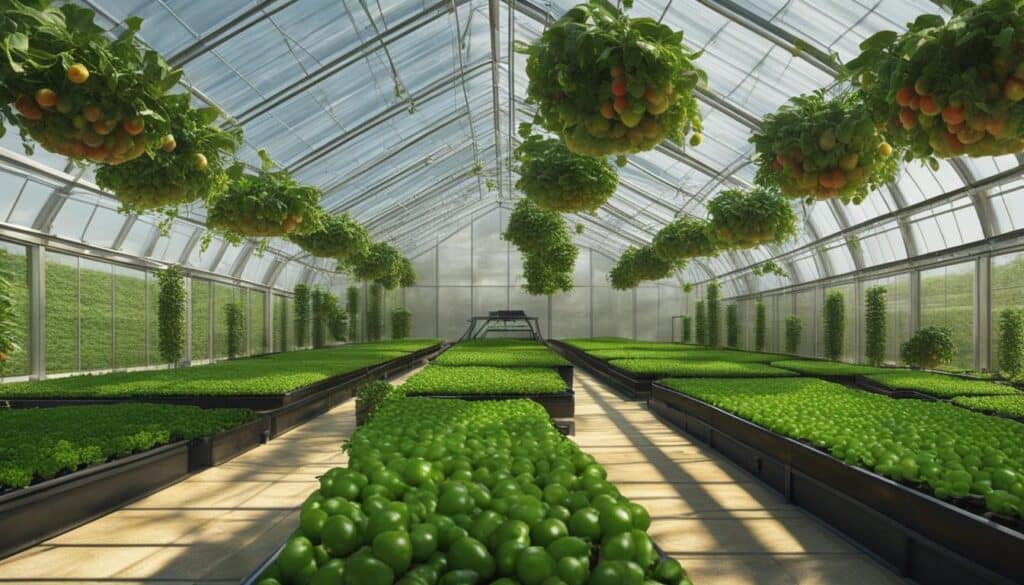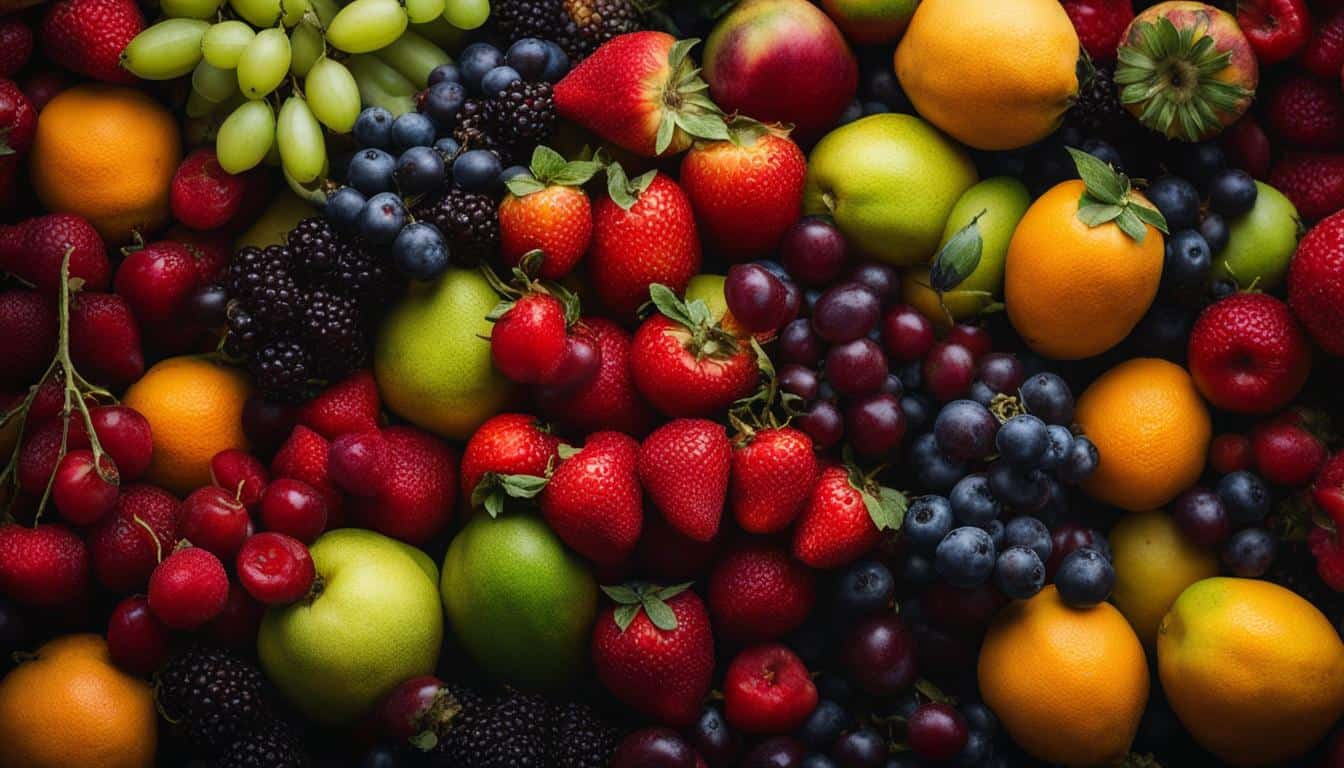Greetings! Today, I want to address a common question that many people have: does organic fruit have pesticides? With the increasing interest in organic food and reducing pesticide exposure, it’s crucial to understand the truth behind organic fruit and pesticides. Let’s dive into the topic and uncover the facts together.
Key Takeaways:
- Organic farming practices focus on improving soil and water quality, reducing pollution, and promoting natural behaviors in farm animals.
- Artificial fertilizers, sewage sludge, and most synthetic pesticides are not allowed in organic farming.
- Organic certification ensures that organic food meets strict government standards.
- Organic produce generally has lower levels of pesticide residue compared to conventionally grown produce.
- Regardless of their organic or conventional status, fruits and vegetables offer essential nutrients and health benefits.
What is Organic Farming?
Organic farming is a sustainable agricultural practice that focuses on improving soil quality, reducing pollution, promoting natural behaviors in farm animals, and creating a self-sustaining cycle of resources. Unlike conventional farming, organic farming prohibits the use of artificial fertilizers, sewage sludge, most synthetic pesticides, radiation, genetic technology, antibiotics, and growth hormones.
In organic crop farming, farmers utilize organic materials, such as plant waste, and implement practices like crop rotation, cover crops, mulch, and the use of natural or approved synthetic pesticides. These methods help maintain soil health and fertility while minimizing pest and disease pressures.
When it comes to farm animals, organic farming practices involve providing healthy living conditions, access to the outdoors, organic food, and disease prevention through vaccinations. By adopting these practices, organic farmers strive to create a harmonious relationship between agriculture and the natural environment.
Benefits of Organic Farming
Organic farming offers several benefits not only for the environment but also for consumers. By avoiding the use of synthetic pesticides and chemicals, organic farming promotes healthier soil and reduces the risk of groundwater contamination. It also helps preserve biodiversity by supporting natural ecosystem functions.
In terms of food quality, organic farming has been shown to produce crops with higher nutrient content, antioxidants, and beneficial phytochemicals. Additionally, organic farming practices contribute to the reduction of greenhouse gas emissions and support the sustainability of agricultural systems.
| Advantages of Organic Farming | Advantages of Conventional Farming | |
|---|---|---|
| Eco-friendliness | Improves soil quality, reduces pollution, promotes natural behaviors | Higher yields, lower production costs |
| Food quality | Higher nutrient content, fewer synthetic chemicals | Consistent availability, longer shelf life |
| Environmental impact | Reduces greenhouse gas emissions, preserves biodiversity | Increased use of pesticides, chemical fertilizers |
Organic farming practices aim to create a sustainable and healthy food system that benefits both people and the planet. By choosing organic products, consumers can support farmers who prioritize environmental stewardship and contribute to the overall well-being of our ecosystems.
Organic Certification and Labeling
In order to ensure the integrity of organic food, the United States Department of Agriculture (USDA) has established a rigorous organic certification program. This program sets strict government standards that organic food must meet in order to be labeled as such. When you see the official USDA Organic seal on a product, it means that it has been certified as organic.
The organic certification program covers all aspects of organic food production, from growing to handling and processing. It ensures that organic farmers follow organic farming practices, which include the use of organic materials, crop rotation, cover crops, mulch, and natural or approved synthetic pesticides. It also requires that organic farm animals are provided with healthy living conditions, access to the outdoors, organic food, and preventative shots.
When it comes to organic labeling, there are different categories that indicate the level of organic content in a product. These categories include “100% organic,” “organic,” “made with organic,” and “organic ingredients.” Each category has specific criteria defined by the USDA guidelines. By understanding the different labels, you can make informed choices about the organic products you purchase.
Organic Certification and Labeling
The USDA has established an organic certification program that requires all organic food to meet strict government standards. Organic food must be grown, handled, and processed according to these standards. Organic products that are certified can use the official USDA Organic seal on their packaging. The certification ensures that the food is produced using organic farming practices. There are different levels of organic labeling, including “100% organic,” “organic,” “made with organic,” and “organic ingredients.” The USDA guidelines define the criteria for each label category.
By choosing organic certified products, you can have confidence that they have been produced with organic farming practices and meet the USDA’s standards. This allows you to reduce your exposure to synthetic pesticides and other potentially harmful chemicals commonly used in conventional farming.
In conclusion, the organic certification and labeling system provides consumers with a clear and reliable way to identify organic products. By choosing organic certified products, you can support sustainable farming practices and reduce your exposure to synthetic pesticides. So the next time you’re shopping for fruits and vegetables, look for the USDA Organic seal to ensure you’re making a choice that supports your health and the health of the environment.
Organic vs Conventional Fruit Pesticides
When it comes to pesticide residues, studies have shown that organic produce generally has lower levels compared to conventionally grown produce. This is because organic farming practices restrict the use of synthetic pesticides, which contributes to the lower pesticide levels in organic fruit.
Conventional farming, on the other hand, allows the use of synthetic pesticides, which may result in higher pesticide residue levels in conventional fruit. Over time, the safety rules for pesticide residue on conventional produce have been lowered, raising concerns among consumers.
It’s important to note that while organic produce may have residue from USDA-approved organic pesticides or airborne pesticides from nearby conventional farms, the overall pesticide levels are still significantly lower compared to conventionally grown fruit.
| Pesticide Residue in Organic Fruit | Pesticide Residue in Conventional Fruit | |
|---|---|---|
| Average Levels | Low | Higher |
| Pesticide Use | Restricted use of natural or approved synthetic pesticides | Use of synthetic pesticides |
| Safety Regulations | Strict government standards for organic certification | Regulations have lowered over time |
“Organic produce generally has lower levels of pesticide residues compared to conventionally grown produce.”
It’s worth mentioning that the potential health risks associated with consuming pesticide residues in both organic and conventional fruit are minimal. The levels found in these fruits are not considered harmful according to scientific research.
While choosing organic fruits can reduce exposure to synthetic pesticides, it’s important to prioritize a diverse diet that includes both organic and conventional produce to ensure optimal nutrition.
Health Benefits of Organic Fruit

When it comes to the health benefits of organic fruit, there are several factors to consider. Studies have shown that organic produce may offer small to moderate increases in certain nutrients, antioxidants, and flavonoids compared to conventionally grown fruit. This means that by choosing organic, you may be getting a little extra nutritional boost from your fruits.
Organic meats and eggs can also offer additional health benefits. Due to pasture feeding, organic meats and eggs may have higher levels of heart-healthy omega-3 fatty acids. These essential fatty acids are known to promote cardiovascular health and have been linked to a reduced risk of heart disease.
Another advantage of organic produce is the lower cadmium levels compared to conventionally grown fruit. Cadmium is a toxic heavy metal that can accumulate in the body over time and has been linked to health issues such as kidney damage and certain types of cancer. By choosing organic, you can reduce your exposure to cadmium.
| Health Benefits of Organic Fruit | Conventional Fruit |
|---|---|
| Higher levels of certain nutrients, antioxidants, and flavonoids | Lower levels compared to organic fruit |
| Heart-healthy omega-3 fatty acids | Lower levels compared to organic meats and eggs |
| Lower cadmium levels | Higher levels compared to organic fruit |
When it comes to organic versus conventional meats, there is a difference in the bacteria present. Conventional meats may have higher amounts of bacteria that are resistant to antibiotics. This is due to the widespread use of antibiotics in conventional animal farming. On the other hand, the overall risk of contamination with bacteria in organic foods is similar to that of conventional foods.
In conclusion, organic fruit can offer several health benefits compared to conventionally grown fruit. From increased nutrient content to lower cadmium levels, choosing organic can be a positive step towards a healthier lifestyle.
Concerns about Pesticides and Organics

When it comes to pesticides and organic farming, there are often concerns about pesticide exposure and the potential risks associated with it. Many people wonder whether consuming organic fruits and vegetables can reduce their exposure to harmful pesticides. It is important to understand the difference between natural and synthetic pesticides and the levels of pesticide residues found in organic and conventional food.
Understanding Pesticide Risks
Both natural and synthetic pesticides can be toxic at certain levels, but the levels found in organic and conventional food are not considered harmful. Scientific studies have shown that the actual risk of pesticide exposure from consuming conventional fruits and vegetables is minimal. Organic farming uses natural pesticides derived from natural substances, while conventional farming uses synthetic pesticides. However, the approved synthetic pesticides used in organic farming are rigorously tested and regulated to ensure their safety.
It is worth noting that organic farming practices aim to minimize pesticide use by utilizing natural or approved synthetic pesticides sparingly. This contributes to lower pesticide residue levels in organic fruits and vegetables compared to conventionally grown produce. While organic produce may still have residue from USDA-approved organic pesticides or airborne pesticides from nearby conventional farms, the overall risk of pesticide exposure from consuming organic or conventional food is considered to be low.
Choosing Organic or Conventional
When deciding whether to choose organic or conventional produce, it is important to consider your personal preferences and priorities. Both organic and conventionally grown fruits and vegetables offer numerous health benefits. They are rich in essential nutrients, antioxidants, and fiber, which are important for overall health and disease prevention. It is recommended to prioritize a diverse diet that includes a variety of fruits and vegetables, regardless of their organic or conventional status, to ensure optimal nutrition.
“While concerns about pesticide exposure are valid, scientific research indicates that the actual risk of pesticide exposure from consuming organic or conventional fruits and vegetables is minimal.”
Ultimately, the choice between organic and conventional produce can depend on factors such as availability, affordability, and personal beliefs. If you are concerned about pesticide exposure, you may choose to buy organic produce or prioritize organic options for the fruits and vegetables you consume most often. However, it is important to note that even conventionally grown produce can be enjoyed as part of a healthy diet, as long as it is washed thoroughly to remove any potential pesticide residues.
Understanding Pesticide Residues
Pesticide residues are trace amounts of pesticides that may remain on or in food after farming and processing. To ensure the safety of consumers, pesticide residue testing is conducted to measure the levels of pesticide residues in food. This testing helps to determine whether the levels are within safe limits set by regulatory agencies such as the USDA and EPA.
Organic farming practices aim to minimize pesticide residues by using natural or approved synthetic pesticides sparingly. By restricting the use of synthetic pesticides, organic farming can result in lower pesticide residue levels compared to conventional farming. However, it’s essential to note that organic produce may still have residue from USDA-approved organic pesticides or airborne pesticides from nearby conventional farms.
| Organic Produce | Conventional Produce | |
|---|---|---|
| Pesticide Residues | Lower levels | Potentially higher levels |
| Pesticide Use | Restricted use of natural or approved synthetic pesticides | Wider range of synthetic pesticides allowed |
When it comes to pesticide residues in food, it’s important to understand that the regulatory agencies have set safe limits to protect consumers. Both organic and conventional farming methods adhere to these regulations, ensuring that the pesticide residue levels are within safe limits. Therefore, consuming organic or conventional produce is unlikely to pose significant health risks from pesticide exposure.
The Importance of Eating Fruits and Vegetables
Eating a diet rich in fruits and vegetables is essential for maintaining good health. These nutrient-packed foods provide a wide range of vitamins, minerals, antioxidants, and fiber that support our overall well-being and help prevent chronic diseases. Whether you choose organic or conventional options, incorporating a variety of fruits and vegetables into your daily meals is crucial for optimal nutrition.
Fruits and vegetables offer numerous benefits to our health. They are low in calories and high in fiber, making them a great choice for weight management and digestive health. The vitamins and minerals found in these foods are essential for proper body functioning, including immune support, cell growth, and repair. Antioxidants, such as vitamin C and beta-carotene, found in fruits and vegetables help protect our cells from damage caused by harmful free radicals. Studies have also shown that a diet rich in fruits and vegetables is associated with a lower risk of chronic diseases, including heart disease, stroke, and certain types of cancer.
While concerns about pesticide exposure may arise, the potential risks are outweighed by the significant health benefits of consuming fruits and vegetables. It is important to note that both organic and conventional produce go through rigorous testing and regulation to ensure they meet safety standards. Washing and peeling fruits and vegetables can further reduce pesticide residues if present. Additionally, choosing a variety of fruits and vegetables from different sources can minimize exposure to any specific pesticide.
| Benefits of Eating Fruits and Vegetables | Health Risks of Pesticide Exposure |
|---|---|
|
|
In conclusion, the benefits of fruits and vegetables far outweigh any potential risks of pesticide exposure. Regardless of whether you choose organic or conventional options, incorporating a diverse range of fruits and vegetables into your diet is essential for optimal nutrition and overall health. Enjoy the abundance of nature’s nutritious bounty and savor the flavors that make each meal a delightful and nourishing experience.
Shopping for Organic Produce

When it comes to buying organic produce, there are a few tips and tricks that can help make it more affordable. It’s no secret that organic food often comes with a higher price tag, but with some smart strategies, you can shop for organic on a budget. Here are some organic food tips to keep in mind:
- Prioritize: Start by prioritizing the organic versions of the fruits and vegetables that you and your family consume the most. This way, you can focus your organic shopping on the items that matter most to you.
- Frozen Options: Consider buying frozen organic produce. Frozen fruits and vegetables can be more cost-effective and still retain their nutritional value. Plus, they have a longer shelf life, allowing you to stock up and save.
- Private Label: Look for private label organic options at supermarkets. These products are often less expensive than branded organic products, giving you the opportunity to save money while still choosing organic.
- Sales and Discounts: Keep an eye out for sales and discounts on organic produce. Many stores offer special promotions on organic items, so take advantage of these opportunities to save.
Additionally, shopping at local farmers markets can be a great way to find affordable organic options. Local farmers often offer organic produce at competitive prices, and you can support small businesses in your community at the same time.
Remember, availability may vary depending on where you live, so be sure to explore different options and find what works best for you. With a little planning and creativity, buying organic produce on a budget is definitely within reach.
The Future of Food Production

As the world continues to grapple with environmental challenges and the need for sustainable agriculture, the future of food production is evolving. Advancements in food production techniques are focused on reducing pesticide use and implementing practices that protect both human health and the environment.
Organic farming has played a significant role in inspiring changes in conventional farming practices. The emphasis on natural pest control methods, such as the use of beneficial insects, has led to a reduction in pesticide use in conventional agriculture. Additionally, hydroponic technology has been adopted to grow crops without the need for extensive pesticide applications.
Conventional farming practices have also evolved to minimize pesticide use and protect the environment. Integrated pest management techniques, which involve careful monitoring and targeted pesticide application, are becoming more prevalent. These practices aim to strike a balance between pest control and reducing the ecological impact of pesticide use.
The Benefits of Organic and Conventional Farming Practices
Both organic and conventional farming methods have their advantages and contribute to the improvement of food production. Organic farming emphasizes the use of natural substances and practices that promote soil health and biodiversity. It avoids the use of synthetic pesticides and focuses on building a sustainable farming system.
Conventional farming, on the other hand, benefits from scientific advancements and technological innovations that improve productivity and reduce waste. While synthetic pesticides are used, there is a growing emphasis on minimizing their use and implementing alternative pest control strategies.
Ultimately, the future of food production lies in the integration of organic and conventional practices. By combining the best elements of both approaches, farmers can produce safe and nutritious food while minimizing negative impacts on the environment and human health.
“The future of food production relies on the continuous improvement of farming practices that reduce pesticide use and promote sustainability. By drawing from both organic and conventional methods, we can create a more resilient and environmentally friendly food system.”
Conclusion
In conclusion, organic fruit has lower pesticide residue levels compared to conventionally grown fruit. Organic farming practices prioritize minimizing the use of synthetic pesticides, resulting in a safer and healthier option for consumers. Studies have shown that the health benefits of consuming organic and conventional fruits and vegetables outweigh the potential risks of pesticide exposure.
Regardless of whether you choose organic or conventional produce, it is crucial to include a diverse range of fruits and vegetables in your diet. Both options offer essential nutrients, antioxidants, and fiber that are vital for overall health and well-being. The key is to prioritize a balanced and varied diet that includes organic and conventional options.
As the future of food production continues to evolve, there is a growing emphasis on reducing pesticide use and implementing sustainable farming practices. Organic farming has inspired advancements in conventional farming methods, encouraging the reduction of pesticide use and the adoption of environmentally friendly practices. The goal is to provide safe and nutritious food while minimizing harm to the environment.
In conclusion, the choice between organic and conventional fruit ultimately depends on personal preference, availability, and budget. Both options can be part of a healthy diet, and the most important factor is to consume a wide variety of fruits and vegetables to maximize your nutritional intake.
FAQ
Does organic fruit have pesticides?
Organic farming practices aim to minimize pesticide use, resulting in lower pesticide residue levels in organic fruit compared to conventionally grown fruit.
What is organic farming?
Organic farming focuses on improving soil and water quality, reducing pollution, promoting natural behaviors in farm animals, and creating a self-sustaining cycle of resources.
How is organic food certified and labeled?
The USDA has established an organic certification program to ensure that organic food meets strict government standards. Organic products that are certified can use the official USDA Organic seal on their packaging.
Are pesticide levels higher in conventional or organic fruit?
Organic farming practices restrict the use of synthetic pesticides, resulting in lower pesticide residue levels in organic fruit compared to conventionally grown fruit.
What are the health benefits of organic fruit?
Organic fruit may have small to moderate increases in certain nutrients, antioxidants, and heart-healthy omega-3 fatty acids. Organic grains also have lower cadmium levels compared to conventionally grown grains.
Are there concerns about pesticide exposure in organic food?
There are concerns about pesticide exposure, but scientific research indicates that the actual risk of pesticide exposure from consuming organic fruits and vegetables is minimal.
What are pesticide residues?
Pesticide residues are trace amounts of pesticides that may remain on or in food after farming and processing. Organic farming practices aim to minimize pesticide residues.
How important is it to eat fruits and vegetables?
Fruits and vegetables offer numerous health benefits and are rich in essential nutrients, antioxidants, and fiber, which are important for overall health and disease prevention.
How can I afford to buy organic produce?
Prioritize organic versions of the fruits and vegetables you consume most often, consider buying frozen organic produce, look for private label organic options at supermarkets, and take advantage of sales and discounts.
What is the future of food production?
The future of food production is focused on reducing pesticide use and implementing sustainable farming practices. Both organic and conventional methods strive to produce safe and nutritious food while minimizing negative impacts on the environment.
Conclusion
Organic farming practices aim to minimize pesticide use, resulting in lower pesticide residue levels in organic fruit. It is important to prioritize a diverse diet that includes both organic and conventional produce to ensure optimal nutrition.
Source Links
- https://www.nbcnews.com/better/health/produce-side-pesticides-what-nutritionist-wants-you-know-about-ewg-ncna864156
- https://www.mayoclinic.org/healthy-lifestyle/nutrition-and-healthy-eating/in-depth/organic-food/art-20043880
- https://www.washingtonpost.com/lifestyle/food/the-truth-about-organic-produce-and-pesticides/2018/05/18/8294296e-5940-11e8-858f-12becb4d6067_story.html





Leave a Reply